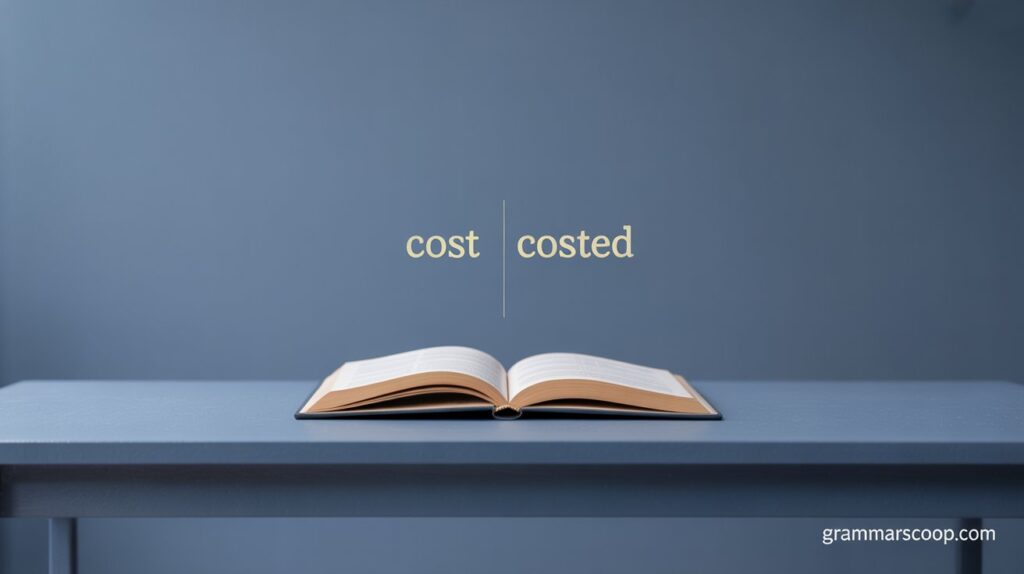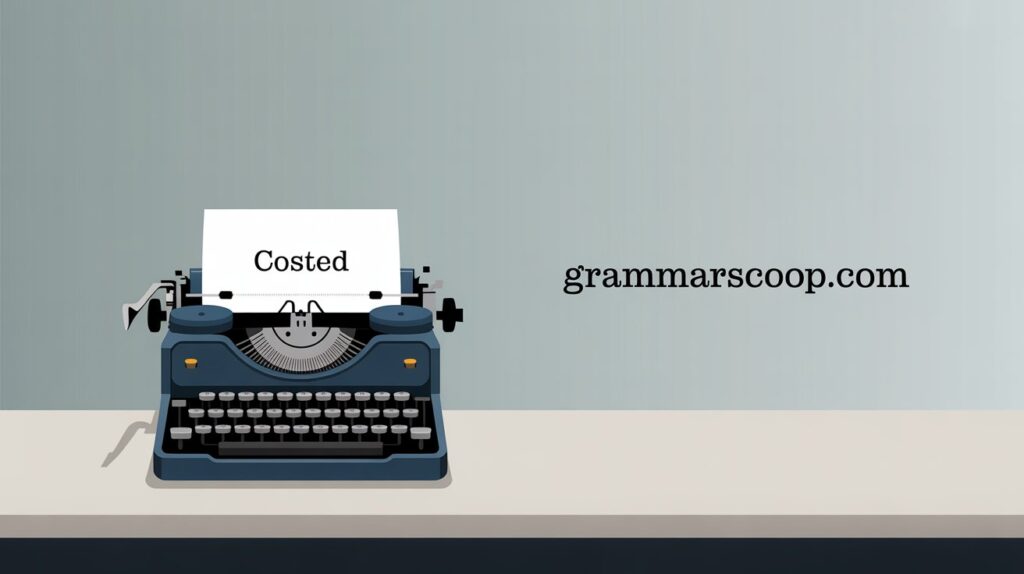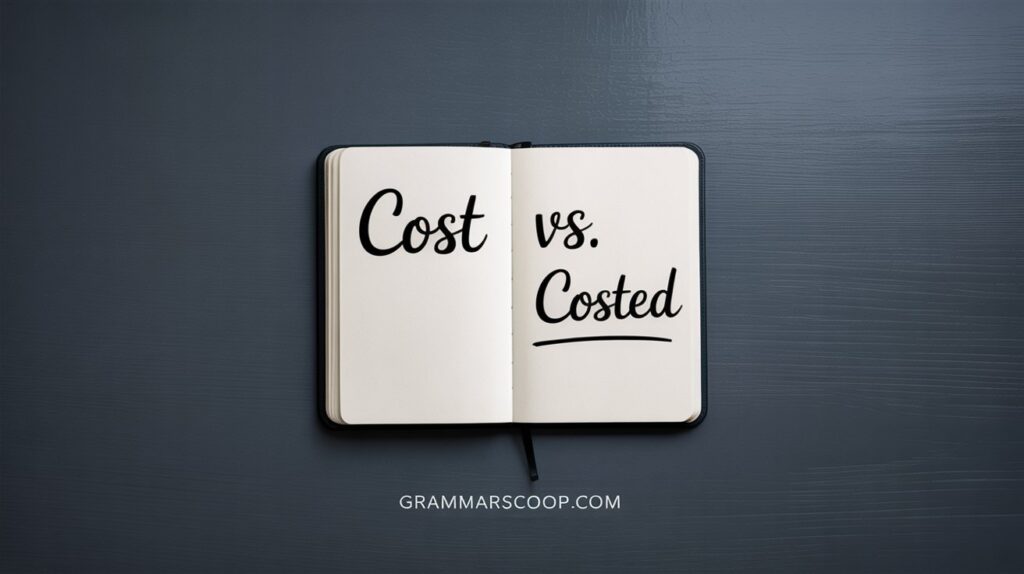The English language is full of irregularities that make even native speakers pause. One such tricky verb is “cost”. If you’ve ever asked yourself whether the cost past tense is “cost” or “costed”, you’re not alone. This guide will clear up the confusion once and for all.
Let’s dig deep into the past tense of cost, when to use “costed”, and how to apply both terms properly in writing and speech.
Understanding the Confusion: Why People Mix Up “Cost” and “Costed”

English learners and even seasoned writers often stumble over verbs like “cost” because they don’t follow the usual pattern. Typically, regular verbs form their past tense by adding “-ed” to the base word. For example:
- Walk → Walked
- Jump → Jumped
- Plan → Planned
But not all verbs play by the rules. Many of the most commonly used verbs in English are irregular. “Cost” is one of them. The cost past tense and past participle is simply cost in most cases. However, “costed” isn’t technically wrong—just more specialized.
So why the confusion? Here are a few real reasons:
- Similarity to other verbs: Words like “post/posted” or “test/tested” mislead people into assuming “cost” works the same way.
- Business and finance lingo: In professional settings, you’ll hear “costed” used frequently.
- British vs American English: In British English, “costed” appears more often in financial contexts.
What Does “Cost” Actually Mean?
Before understanding the past form of cost, we need to grasp what “cost” means.
As a verb:
- To require payment: “The meal cost $20.”
- To sacrifice or lose something: “The decision cost him his job.”
As a noun:
- The price of something: “The cost of living is rising.”
- The amount of sacrifice or effort required: “Freedom comes at a cost.”
Transitive vs. Intransitive:
- Transitive: It takes a direct object. Example: “It cost me everything.”
- Intransitive: Less common. Example: “It cost too much.”
The versatility of “cost” means it shows up in a variety of contexts, making it essential to understand how its forms behave.
So, What’s the Past Tense of “Cost”?
Here’s the short answer: The correct past tense of cost is “cost.”
“I bought the phone yesterday. It cost me $800.”
This makes “cost” an irregular verb, just like:
- Cut → Cut
- Hit → Hit
- Put → Put
These verbs do not change in the past tense, and that’s perfectly acceptable in both formal and informal writing.
The full verb form table for “cost” is:
| Tense | Form | Example |
|---|---|---|
| Base | cost | “They cost too much.” |
| Past Simple | cost | “It cost more than I expected.” |
| Past Participle | cost | “That choice has cost him dearly.” |
| Present Participle | costing | “She is costing out the budget.” |
When Is “Costed” Acceptable or Correct?
Despite what some grammar guides say, “costed” does have its place—just not in everyday use.
“Costed” is used only in specific contexts, typically related to analysis, planning, and estimation.
Financial Estimation & Business Jargon
In project management, accounting, or consulting, professionals use “costed” to describe the act of calculating or estimating cost.
“The construction proposal was carefully costed by the engineers.”
Here, “costed” implies an action—they performed a costing exercise.
Deliberate Action in Forecasting or Planning
Think of “costed” as referring to a process rather than the end amount.
“We haven’t fully costed out the implications of the merger.”
This is especially common in British English, where such usage is more accepted in business and media.
Usage in British English
In the UK, phrases like “fully costed plans” appear in politics, media, and economics. Examples include:
- “Labour presented a fully costed manifesto.”
- “The defense budget was costed in advance.”
So while “cost” remains the default past form of cost, “costed” is valid in technical and analytical settings.
Quick Comparison: “Cost” vs. “Costed” in Practice
Here’s a side-by-side breakdown for clarity:
| Form | Correct Context | Example Sentence |
|---|---|---|
| Cost | Talking about price paid, sacrifice, or expense | “Her mistake cost the company millions.” |
| Costed | Talking about estimating or calculating price in business or analysis | “The accountants costed the new proposal.” |
Tip: If you’re describing something that already happened and involves money paid or lost, use “cost.” If you mean the act of analyzing or calculating something, use “costed.”
Verb Forms of “Cost” in All Tenses
Here’s a comprehensive chart showing how to use “cost” across different tenses:
| Tense | Form | Example |
|---|---|---|
| Present Simple | cost/costs | “It costs too much.” |
| Present Continuous | is costing | “This is costing more than expected.” |
| Past Simple | cost | “The dress cost $200.” |
| Past Continuous | was costing | “The delay was costing us money.” |
| Present Perfect | has cost | “This has cost me my job.” |
| Past Perfect | had cost | “It had cost them dearly.” |
| Future Simple | will cost | “The ticket will cost you.” |
| Future Perfect | will have cost | “By then, it will have cost millions.” |
Sentence Examples with “Cost” and “Costed”
Examples Using “Cost” (Standard Usage)
- “That new laptop cost me $1,500.”
- “His mistake cost him the promotion.”
- “It cost us valuable time.”
- “Freedom often costs more than expected.”
Examples Using “Costed” (Technical/Analytical Usage)
- “The project was costed at $2.4 million.”
- “They costed the proposal last quarter.”
- “We’ve already costed out the expansion plans.”
Remember, costed is rarely used in casual or personal contexts.
Common Synonyms for “Cost” and “Costed”
Expanding your vocabulary improves clarity and avoids repetition. Let’s look at some fitting synonyms:
Synonyms for “Cost” (General Use)
- Price
- Charge
- Expense
- Fee
- Outlay
Example: “The price of the iPhone has increased.”
Synonyms for “Costed” (Analytical or Planning Contexts)
- Estimated
- Calculated
- Evaluated
- Budgeted
- Projected
Example: “They estimated the repair would cost $10,000.”
Origin and Etymology of the Verb “Cost”

The word “cost” comes from the Old French word coster, meaning “to stand firm” or “to be fixed.” That evolved from the Latin verb constare, meaning “to stand together, to be settled.”
Over centuries, the meaning shifted from “to stand firm” to the modern sense of something being valued or priced.
Its irregular past form has survived from early English due to frequent usage, similar to “hit” or “put.”
Final Verdict: Should You Use “Cost” or “Costed”?
If you’re still unsure, here’s the ultimate guide:
Use “Cost” when:
- Talking about money spent or value lost
- Referring to past tense in general scenarios
“The trip cost me a fortune.”
Use “Costed” when:
- Referring to the act of estimating or evaluating cost
- Writing in business, finance, or technical contexts
“The marketing campaign was costed before approval.”
Explore further:
- Full Time or Full-Time: Which Writing Form Is Accurate?
- Sense Vs Since: A Clear Guide to Choosing the Right Word
- Than vs Then: Fixing Everyday English Errors
- Igniter or Ignitor: How to pick the right spelling?
- Hustle or Hussle: How should it be spelled?
Bonus: Quick Reference Guide
| Use Case | Correct Form | Quick Tip |
|---|---|---|
| Past price/sacrifice | Cost | Default form for past tense of cost |
| Financial estimation | Costed | Only for planning, forecasting, and business |
Final Thoughts on the Cost Past Tense
The past form of cost is generally cost, not costed. This irregular verb bucks the standard “-ed” rule but remains grammatically correct. However, “costed” isn’t entirely wrong—just context-specific.
Next time you’re writing or speaking, ask yourself: Am I referring to a price that was paid? If yes, go with cost. But if you’re analyzing, forecasting, or breaking down financials, costed might be your best bet.
So now you know: the cost past tense and past participle is usually cost, but if you’re crunching numbers like a CFO? “Costed” could be just right.
Have more confusing verbs in mind? Let this be your grammar cheat sheet. Happy writing!
FAQs
Is “costed” ever grammatically correct?
Yes, but only in specific contexts like financial planning or estimation. In those cases, “costed” refers to the action of calculating cost.
Is “cost” an irregular verb?
Yes. “Cost” doesn’t follow the regular -ed rule. The past tense and past participle of “cost” is still “cost.”
Which is correct: “It cost” or “It costed” me $100?
“It cost me $100” is correct. “Costed” would be incorrect here.
Is there a difference between British and American usage?
Yes. British English is more likely to use “costed” in business or financial contexts, while American English sticks to “cost” in most cases.
Can I use “costed” in casual conversation?
Technically, yes—but it will often sound awkward unless you’re discussing budgeting or planning. Stick to “cost” for everyday use.
What’s the cost past form in a sentence?
Example: “The new furniture cost us more than expected.”
Is there a cost past tense verb rule?
Yes. As an irregular verb, “cost” doesn’t change in the past tense or past participle. So the rule is simple: past tense = cost.

Lisa Morris is a seasoned blogger and language enthusiast with a passion for making grammar simple and engaging. At Grammar Scoop, she shares clear, concise tips that help readers master the rules of English with confidence.






